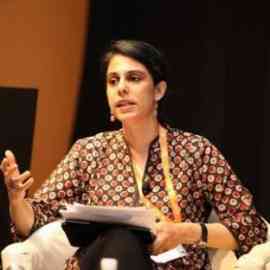Smita Srinivas
Smita Srinivas works in economics and public policy, with extensive advisory experience in economic development, technological innovation, and industrial policy. At NCBS, she is Visiting Professor and the India lead and Co-Investigator on an Economic and Social Research Council-funded East Africa-India-UK research collaboration to improve access to cancer care. The project addresses an emerging health crisis in Sub-Saharan Africa, where an increasing number of people are dying from cancer through poor diagnosis and treatment, and exclusion from treatment by the lack of ability to pay for it. Her research focuses on the industry dynamics, market instruments, and healthcare priorities for cancer care in India. The project also considers the economic institutions of market design and policy reform, and global scientific, technology development, and engineering gaps to be domestically effective as well as to complement efforts in Kenya and Tanzania. For more information about the project, click here. Smita leads a team of researchers from a multi-faceted background in economics, engineering, and science policy.
Prof Srinivas has been the Founder Director of the Technological Change Lab (TCLab), a research centre and platform originally at Columbia University. She is affiliated with CTIER, India; the Economics Department & IKD Centre at the Open University UK; and Science/Engineering at the Science, Technology, Engineering, and Public Policy department at University College London. In senior advisory and executive appointments in the US, East Africa, and India, she has been Head of School, Director, and Co-chair to establish global higher education programs with interdisciplinary and multidisciplinary efforts towards more effective economics and economic development. She has held other full-time or visiting academic appointments at Columbia University, Harvard University, London School of Economics and Political Science (LSE), and the Indian Institute of Science (IISc).
Her research and policy efforts have been invited to a wide range of global think-tank panels and affiliations. She has over two decades of advisory and consulting experience including programs of public, business, and non-profit clients. These efforts include high-level expert reviews, plans and goal-setting, reform strategy, competitive investment domains, M&E, research and performance metrics, and ethical, high-impact process and partnerships. Organisations have included the Karnataka government, several global agencies of the United Nations, Engie the global energy services company, Aga Khan University, SEWA, the International AIDS Vaccine Initiative, the OECD, and many others.
She currently serves on the journal advisory boards or scientific committees of Innovation and Development; African Journal of Science, Technology, Innovation and Development; PSL Quarterly Review, and The Review of Evolutionary Political Economy REPE. Her work has been recognised by the Economics and Social Research Council (ESRC) UK 2018; Institute for New Economic Thinking INET Young Scholars Initiative; Indo-Swiss ICSSR Scholars Exchange Grant; World Health Organization (WHO); United Technologies Corporation (Centre for Public Problem-Solving and NIP partnership); Tekes/Tampere University of Technology; Ford Foundation; Rio Government, FAPERJ Columbia Global Centres; Columbia University Institute for Social and Economic Research and Policy ISERP (Quantitative Methods Research and Seed Grant); Columbia University Institute for Latin American Studies grants; several Harvard University Fellowship awards at the Belfer Center, Kennedy School of Government; Harvard University Women in International Affairs mentors award; MIT Centre for International Studies, Energy, Technology, International Affairs grant; Mellon-MIT Research Grant; Industrial Performance Centre MIT; and nominated to membership, Sigma Xi, U.S. Science Honor Society.
Prof. Srinivas has been selected as the 2021 Clarence E. Ayres Scholar by the Association for Evolutionary Economics (AFEE) for her outstanding contributions to the field of institutional economics." She has been recognised for contributions to theoretical perspectives with the biennial 2015 EAEPE (Gunnar) Joan Robinson Prize from the European Association for Evolutionary Political Economy for her book “Market Menagerie: Health and Development in the Late Industrial States” (Stanford University Press, 2012) and for applied impact as a Young Urban Leader in 2014 at the World Cities Summit, Singapore.
She has prior training in economics, physics, and mathematics from Europe and the US. Her PhD at the Massachusetts Institute of Technology (MIT) focused on economic development and policy process, and specialised in microeconomics, technology, and industrial policy, with a minor field in public finance.



